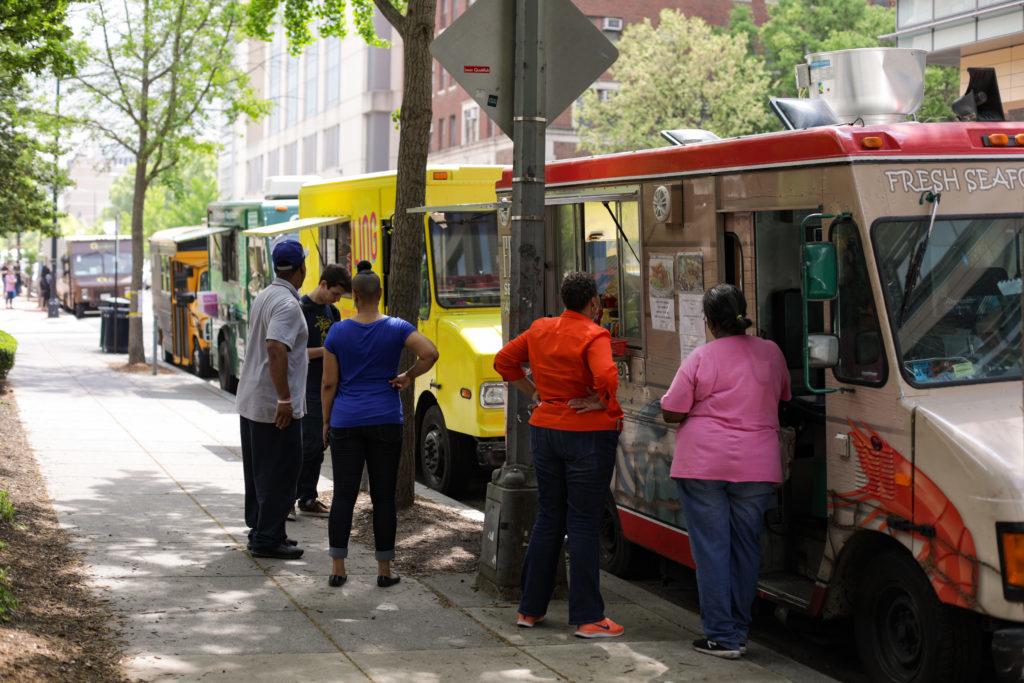The construction project that has disrupted life on H Street is expected to last at least another month.
Workers at the electric company Pepco are adding new electric tubes beneath H and 20th streets. The latest round of construction is the third part of a four-phase project that will not be completed until June, according to a company release. Neighbors and students said construction noise has rattled area residents and food truck owners said the work has forced them out of their usual spot on H Street, hurting their businesses.
The project – which began along I Street in September – will install new electrical wiring in the area, increasing the amount of electricity the wires can handle to prevent a potential system overload, and improve the reliability of electrical service. The final phrase, which will begin in May, will add high voltage cables through the newly-constructed tubes beneath H Street, the company said.
Pepco spokesman Erik Winkfield said the company met with GW officials before starting the project to discuss ways to reduce disruptions for people traveling around campus. He did not provide further details about those efforts.
“Completing this project helps ensure we can continue to support the electric needs of the families and businesses we serve,” he said in an email. “We will continue to keep the community informed as progress continues.”
Winkfield said Pepco worked with the D.C. Department of Transportation to develop traffic control plans to protect drivers and pedestrians once the project got underway. Crews have held caution signs to direct traffic on H Street during construction.
Winkfield declined to say if construction could affect the electricity or water in the surrounding buildings, how the company has been communicating with the University throughout the process, if they communicated with food trucks before relocating them and when the food trucks could return to H Street.
University spokesman Brett Zongker said in an email that the University could not control whether the project would take place, but officials told Pepco that there are “high-use buildings” surrounding the construction area.
“GW doesn’t control this project, but we are in contact with Pepco so as to mitigate any impacts,” he said.
Zongker declined to provide any further details and deferred to Pepco for more information.
The construction has forced food trucks that normally line H Street outside Gelman Library to relocate to 22nd Street.
Some food truck owners said Pepco did not warn them that they would have to move and that they have lost business since moving to their new location.
Naht Dang, an employee at Tasty Kabob food truck, which serves traditional Afghani food, said the city transportation department told him on the day the project began that he would have to relocate. He said sales have fallen 15 to 20 percent because students don’t know where the food truck is, driving them to eat elsewhere.
“They put up the sign on that day,” he said. “This was something that was supposed to be done two or three weeks ago.”
D.C. officials posted a sign outside of District House warning that parking is restricted in the area from April 8 to May 6 between 10 a.m. and 4 p.m. The sign was not printed until April 20.
Students and neighbors said Pepco’s construction project forces students to walk in the road, creating more safety concerns in an already highly traveled area along H Street where many University buildings are located.
In February, neighbors and students proposed adding a crosswalk to the middle of H Street between 21st and 22nd streets because many pedestrians jaywalk across the street instead of using crosswalks at the intersections.
Sophomore Shannon McKeown said she is concerned about safety in the construction area, especially when people cross H Street.
“The crosswalk is dangerous because there’s no real organization,” McKeown said. “There are a couple of construction workers, but they’re not really directing the traffic.”
Julia Korsyn, a sophomore District House resident and tour guide, said the construction around campus is harming prospective student’s perceptions of the University. Throughout the past month, GW has been hosting admitted students days as the University tries to recruit prospective students ahead of the May 1 response deadline.
“They think, ‘Oh my God. There’s so much construction. What’s going on here?’” she said. “And I’m like it’s just one street I promise. They don’t understand the layout of the campus, so I definitely think it’s interfering with the tours.”
Justine Coleman contributed reporting.





